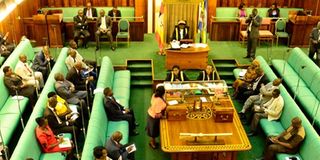URA to lose Shs45b in MPs tax exemption

Parliament in session. A senior legal officer in Parliament says the decision to adopt an amendment to the Constitution on the floor of Parliament is at the discretion of the Speaker. PHOTO BY ERIC DOMINIC BUKENYA
KAMPALA. Lawyers and the Uganda Revenue Authority have disagreed with President Museveni’s U-turn on MPs’ tax exemption, and warned that the amendment to the disputed Income Tax Bill, 2016, was in contempt of court.
The URA Commissioner General, for example, says if the Income Tax Bill, 2016 that MPs hastily passed to insulate themselves is assented to, it will “seriously erode the tax base”.
Mr Alex Bashasha, a lawyer, said debating the Bill contradicted Article 92 of the Constitution, which prohibits passing of retrospective legislation. The Article states that Parliament shall not pass any law to alter the decision or judgment of any court as between the parties to the decision or judgment.
“If MPs want reduced taxes on food allowances, fuel and the like, then they should make legislations to be given coupons for food, they can also be given fuel cards for fuel and no one will tax them. But as long as they are still being given money, it has to be taxed,” he added.
Kadaga explains
Mr Bashasha was reacting to reports that President Museveni had made a U-turn after condemning legislators’ tax exemption as “politically and morally incorrect”. In her presentation at the NRM Caucus last week, Speaker Rebecca Kadaga defended MPs on tax exemption, explaining how since the Sixth Parliament, the respective Attorney Generals have advised that under Section 19 of the Income Tax law, mileage is exempted from taxation.
After listening to Ms Kadaga’s presentation, the President told members that he was not aware that what was being taxed was mileage allowances and in spite of refusing to sign the Bill and throwing it back to the Speaker, promised to talk to “the [ministry of] Finance people” about the issue.
Minister for Presidency Frank Tumwebaze last week confirmed the President’s decision and explained that on getting additional information he appreciated the logic.
URA boss raises red flag
Ms Doris Akol, the Commissioner General URA, told Daily Monitor last Friday that the allowances which MPs seek to exempt fall under taxable income bracket and that, any attempts to exempt themselves will create a big hole in the domestic revenues needed to support the budget and other government programmes.
“We believe that the allowances the honourable MPs seek to exempt from taxation do not meet the tests prescribed in law for exemption either as mileage or travel reimbursements,” Ms Akol said.
“The MPs move to exempt themselves from income Tax will seriously erode the tax base to a tune of at least Shs45 billion per annum. This is based on current rates of earning. It also erodes the principle that prescribes that all employment income must be taxed.”
Ms Akol’s comments came on the day Speaker Rebecca announced that Parliament had secured an injunction, restraining URA from taxing MPs emoluments until the appeal is heard. She revealed this at a farewell party she organised for the former MPs who lost their seats in the February elections.
In line with the civil society groups, the lawyers have advised the president not to sign the bill. Explaining what constitutes taxable income, quoting section 2(2) of the Income Tax Act, Mr Bashasha explained that the MPs derive income from their employment with government which income is subject to tax as set out in section 19 of the Income Tax Act.
The incomes as set out in section 19 which are to be taxed are; wages, salary, leave pay, gratuity, bonus, the amount of any travelling, entertainment, cost of living, housing, medical or other allowances and value of any benefit granted. “The law is very clear; any benefit must be taxed so why should MPs be exempted on allowances?” Mr Bashasha asked, revealing that five organisations and a number of individuals had contacted his law firm, to challenge the law in the Constitutional Court so that it is annulled.
According to Uganda Law Society President, Francis Gimara, Mr Bashaha, Mr James Nangwala and Mr Ladislaus Rwakafuuzi and other senior lawyers, the bill in question is discriminatory and violates Article 21 of the Constitution.
They add that any attempt by Parliament to defeat the ruling of Justice Henry Peter Adonyo of the Commercial Court delivered on January 29, does not just amount to contempt of court but also portrays the MPs as insensitive to “a bleeding economy.”
In the case of Francis Byamugisha vs Attorney General, Parliament and URA HCCS No 745 of 2013 ruled that all emoluments paid to MPs are subject to income tax. The Court further directed the Parliamentary Commission to collect with immediate effect any taxes due to the government from the date of the decision going forward.
However, before the Appeal lodged by parliament could be heard, MPs decided to amendment Income Tax law to shield their allowances.
Mr Dan Ngabirano, a Tax Law Lecturer at the School of Law Makerere University said while it’s within the ambit of Parliament to make laws on any matter, the decision by MPs to exempt their allowances disregards the moral obligation to uphold the principle of equity.
“The dilemma is that tax is a creature of the law and at the same time, Parliament is vested with the mandate to pass all laws,” Mr Ngabirano said, adding that “In this case however, there is a conflict of interest in as far as Parliamentarians seek to exempt themselves from certain aspects of income taxation. Under the principle of equity, taxes must be proportionate to income and ability to pay. MPs have a legal and moral obligation to uphold this principle in exercising their mandate.”



